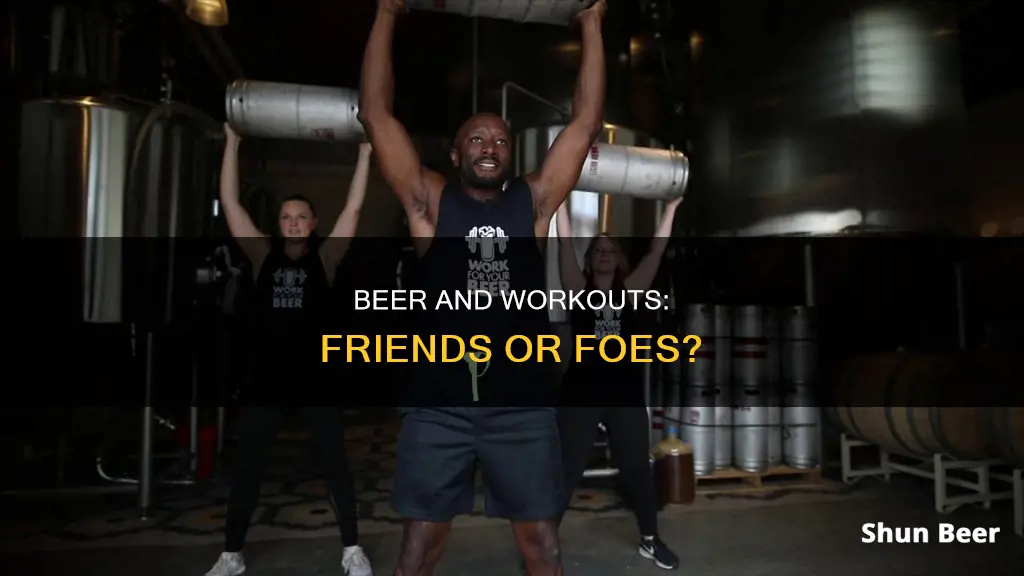
Drinking beer after a workout is a common way to celebrate or socialise with friends. But is it a good idea? The answer depends on several factors, including your fitness goals, the amount of beer consumed, and the alcohol content of the beer.
Drinking beer after a workout can affect your post-workout recovery. Beer is a diuretic, which means it increases urine production and can lead to dehydration. This effect is more pronounced when consuming beers with an alcohol content above 4%. Additionally, alcohol can interfere with protein synthesis, leading to impaired muscle recovery and reduced muscle mass gains. It can also disrupt sleep, negatively impact nutritional balance, and cause weight gain.
However, some sources suggest that drinking a low-ABV beer (less than 4%) can be effective for post-workout hydration. Beer contains carbohydrates and sodium, which can aid in rehydration. Additionally, beer contains polyphenols, which are antioxidant and antiviral compounds that may boost the immune system and reduce the risk of respiratory infections associated with heavy training.
In conclusion, while drinking beer after a workout may have some potential benefits, it is generally not recommended if you have specific fitness goals or are concerned about optimal recovery. The negative effects of drinking beer after a workout are more pronounced with higher consumption and beers with higher alcohol content. As always, moderation is key.
| Characteristics | Values |
|---|---|
| Alcohol before exercise | Not recommended |
| Alcohol after exercise | Not recommended, but a low-ABV beer is better than a high-ABV beer |
| Alcohol and dehydration | Alcohol is a diuretic, which causes dehydration |
| Alcohol and muscle recovery | Alcohol inhibits protein synthesis, which is necessary for muscle recovery |
| Alcohol and sleep | Alcohol negatively affects sleep, which is important for muscle recovery |
| Alcohol and weight gain | Alcohol contains 'empty calories' and can lead to weight gain |
| Alcohol and electrolytes | Beer contains more electrolytes than spirits or wine |
| Alcohol and nutrition | Alcohol inhibits the absorption of nutrients |
| Alcohol and cortisol | Alcohol increases cortisol levels |
| Alcohol and testosterone | Alcohol decreases testosterone levels |
| Alcohol and medication | Alcohol can negatively interact with medication |
| Alcohol and moderation | Moderate alcohol consumption is not detrimental to health |
What You'll Learn

Drinking beer after a workout can be good for rehydration
To that end, a non-alcoholic beer is a good option, as it provides the social aspects of drinking without the harmful effects of alcohol. Athletic Brewing, for example, focuses on non-alcoholic beer and sparkling water made specifically for athletes. In recent years, Olympians have been drinking non-alcoholic beers after workouts and competitions.
If you're going to drink beer after a workout, it's important to drink plenty of water too, to ensure your body can fully rehydrate. It's also a good idea to eat a nutritious meal or snack consisting of carbohydrates and protein, to aid your body's recovery process.
While drinking beer after a workout can be good for rehydration, it's worth noting that it can have other negative effects on your body. For example, alcohol can slow the natural recovery process by elevating cortisol levels, decreasing testosterone levels, and inhibiting protein synthesis, which is necessary for muscle repair and growth. It can also affect your sleep, which is an important part of the workout recovery process.
Beer and Pregnancy: First Trimester Drinking Concerns
You may want to see also

Beer is better than spirits post-workout
Drinking beer after a workout is not necessarily a bad thing. In fact, a study published in the International Journal of Sport Nutrition and Exercise Metabolism found that light beer could be a decent recovery aid post-exercise, even as good as water in some aspects.
Beer, especially low-ABV beer, can be an effective post-workout hydrator. According to Brad Schoenfeld, a Men's Health exercise science advisor, beer has carbohydrates and some sodium, which can be beneficial post-exercise. He also notes that beer is tastier than water, which may encourage people to rehydrate more.
Additionally, beer contains polyphenols, which are antioxidant and antiviral plant compounds. These polyphenols can help keep your immune system strong and reduce the chances of respiratory infection associated with heavy training.
However, it is important to note that excessive alcohol consumption can negatively impact your health and fitness. The key is to drink in moderation and prioritize hydration, especially if you are engaging in competitive sports or have specific fitness goals.
So, if you're looking for a post-workout drink, beer may be a better option than spirits, but always remember to drink in moderation and listen to your body's needs.
Beer and Vitamin D2: What's the Verdict?
You may want to see also

Alcohol before exercise is worse than after
Alcohol affects your coordination, balance, and spatial awareness. This means you're more likely to trip over, drop a weight, or injure yourself. It's best to wait until you're fully sober before exercising. The more you drink, the worse your athletic performance gets. If you've consumed a lot of alcohol the night before, you might still be under the influence, and exercise is not advised due to the risks associated with heart arrhythmias.
Alcohol is a diuretic, which means it makes your body produce more urine, leading to dehydration if you don't drink enough water. This is especially important to consider when exercising, as you will typically be dehydrated after due to sweating. If you then drink alcohol, it will take longer to rehydrate and recover, and you'll feel sore for longer.
Drinking alcohol after exercise can also reduce your body's ability to synthesise proteins. When you exercise, small tears appear in your muscles, and your body uses protein to rebuild them. However, drinking alcohol makes it harder for your body to use these proteins, so you'll build less muscle.
Weight gain is also a concern when drinking alcohol after exercise. Alcohol contains 'empty calories', which means it provides a lot of energy but little nutritional value. These calories are more likely to be turned into fat.
However, drinking a beer or two after a workout is not necessarily a problem, and moderate alcohol consumption may even have some health benefits. Lagers, ales, and stouts are probably the 'least bad' option if you're drinking after exercise, as they tend to contain more electrolytes and carbs than spirits or wine, which can aid your body's recovery.
Weed and Beer: Mixing Effects and Experience
You may want to see also

Drinking after a workout can negatively impact muscle recovery
Drinking beer after a workout can negatively impact muscle recovery. Alcohol slows down the natural recovery process by elevating cortisol levels, decreasing testosterone levels, and inhibiting protein synthesis. The body prioritises dealing with the toxins produced by alcohol over other functions, such as producing glucose or clearing lactic acid.
Drinking alcohol after exercise can also affect your body's ability to synthesise proteins. When you exercise, small tears appear in your muscles, and your body uses protein to repair them. However, consuming alcohol makes it harder for your body to use these proteins, which means you'll build less muscle.
Additionally, alcohol is a diuretic, which means it encourages your body to produce more urine, leading to dehydration if you don't drink enough water. Dehydration can further delay the recovery process and leave you feeling sore for longer.
If you're nursing an injury, alcohol could be detrimental to your recovery. It can introduce additional swelling to your tissues by opening up blood vessels and inhibiting the functions of hormones that aid in the recovery process, such as testosterone.
While having a drink after a workout once in a while may not have long-term effects, regular alcohol consumption can impact your fitness goals, especially if it leads to hangover-induced sluggishness or weight gain.
Beer and Keppra: What You Need to Know
You may want to see also

Drinking after exercise can cause weight gain
Drinking beer after a workout is not necessarily harmful, but it is important to be aware of how it can affect your body's ability to rehydrate and recover. Alcohol is a diuretic, which means that it makes your body produce more urine. This can lead to dehydration if you don't drink enough water. In addition, alcohol can affect your heart rate and heavy drinking can lead to arrhythmias (abnormal heart rhythms).
The impact of alcohol on the body's ability to synthesise proteins is another important consideration. When you exercise, small tears appear in your muscles, and your body uses protein to repair these tears. However, drinking alcohol makes it more difficult for the body to use proteins, according to the PLoS ONE journal. As a result, you will build less muscle than you would without alcohol.
Weight gain is also a concern when drinking alcohol after exercise. Alcohol contains 'empty calories', which means it provides a lot of energy but little nutritional value. This means that the calories from alcohol are more likely to be converted into fat. A single beer contains around 200 calories, which is equivalent to a chocolate chip cookie. Drinking four beers is the same as eating a Big Mac in terms of calorie intake.
If you are trying to lose weight, you need to burn off these extra calories in addition to the calories you consume from food. Even light beers contain the empty calories of alcohol, which can lead to poor health if consumed in excess without regular exercise. Therefore, if you are concerned about weight gain, it is important to consider the impact of alcohol consumption on your overall calorie intake and make sure that you are expending more calories than you are consuming.
Regular alcohol consumption can also set you back in your fitness goals if it leads to hangover-induced sluggishness or weight gain. However, if you are exercising for fun or to maintain your fitness levels, moderate alcohol consumption is generally not something to worry about. In fact, a study published in the British Journal of Sports Medicine found that regular exercise can help mitigate some of the long-term health issues associated with drinking.
Beer and Prostate Surgery: What You Need to Know
You may want to see also
Frequently asked questions
Drinking beer before a workout is not recommended. Even a small amount of alcohol can affect your coordination, balance and spatial awareness, making you more prone to injuries.
Drinking beer after a workout can affect your post-workout recovery. Beer is a diuretic, which means it will make you dehydrated as it makes your body produce more urine. It also reduces your body's ability to synthesise proteins, which are essential for muscle recovery.
According to experts, drinking one or two beers after working out won't harm you, but it won't make for the best recovery either. The negative effects of drinking alcohol after working out increase the more you drink.







